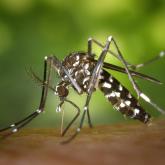Officiële Lancering van NEHAP3: Een Nieuwe Fase voor Milieugezondheid in België
Vandaag bereiken we een mijlpaal met de lancering van het Derde Nationaal Actieplan Leefmilieu-Gezondheid (NEHAP3), een plan dat twee decennia van inspanningen bekrachtigd om België veerkrachtig en duurzaam te maken.













